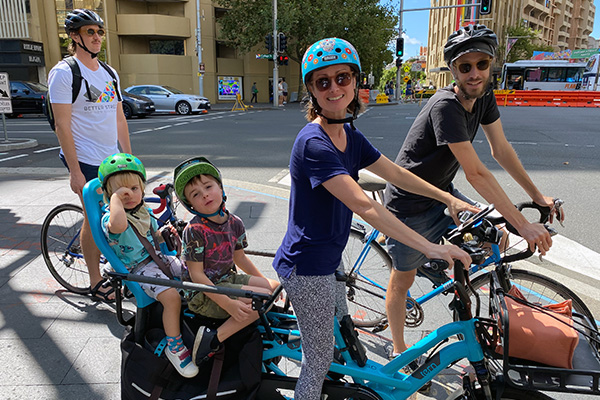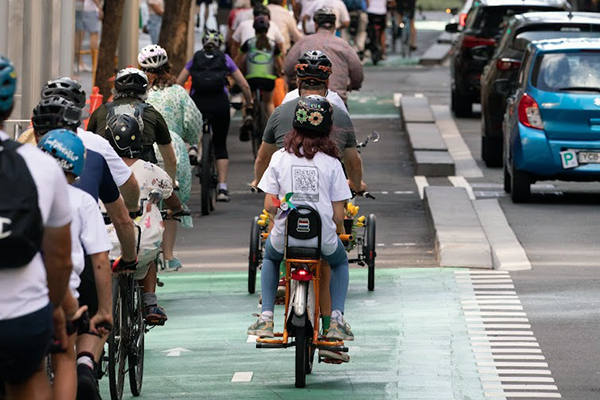And it’s coming back clean!
History comes in waves. As the City of Sydney’s electrification of transport strategy illustrates. Even the name evokes the marvel of the Victorian industrial age. But now it’s driven by the climate emergency and powered by 100% renewables. So, from an environmental perspective, it’s great to see progress on a key Sustainable Sydney 2030-2050 pledge. We are also pleased that there is no back pedalling on Sydney’s commitment to walking and cycling. Check out our submission here.
A fun e-bike-led revolution to tackle the cost of living and climate blues (Image credit: Better Streets Weekend)
Building a city for all
Sydney’s mission to reduce car usage and improve access to active and public transport remains its primary focus. This relates directly to the City of Sydney’s vision of a city for all - not just the strong and the wealthy. This plan therefore prioritises public space and optimum access and convenience for the whole community. After two decades battling to rebuild a city for people rather than cars, there’s no turning back. Hence we’re encouraged that central Sydney’s streets won’t revert to traffic sewers just because ICE vehicles are replaced by electric models. Included in the electrification strategy is a strong focus on ‘high impact’ transportation including freight and electric buses. It’s also good to know the City of Sydney will advocate for state and federal e-bike subsidies. As they are much fairer on people and planet than electric cars.
Imagine this on Oxford St! The London Electric Bus Co., circa 1907 (Image credit: Snopes;
Fact-checked by The Economist )
E-bikes tackle climate and transport poverty by multiples of 10
It’s all about fairness. Environmental and social. Because, in a cost of living crisis, who has a lazy $20 000 for a subsidised EV? Plus maintenance and parking. Alternatively, more people (with or without a driver’s licence) can afford subsidised e-bikes which are already 10-20 times cheaper. In addition, the projected 10-year glacial roll-out of large EVs will make zero difference. But decarbonisation is a race we can’t afford to lose. And there’s no wooden spoon for virtue-signalling losers.
So we’ve recommended that the City of Sydney doubles the amount of e-bike charging facilities. Because twice as many people are buying e-bikes as cars. Furthermore, bike corrals should be established with integrated charging ports. These must occupy parking spaces and not footpaths. Eight bikes can fit in a single parking space - an eight-fold uptick in efficiency and an incentive for bike-loving businesses to support streetscape upgrades.
Small is beautiful! At a fraction of the energy, cost and space of EVs, we’re saying e-bike subsides now!
(Image credit: Better Streets Weekend)
E-bikes meanwhile, use one fortieth the invested carbon to build and a fraction of the amps required by an EV to run.
Then there’s the algorithmic superpower of last mile delivery as bikes use an eighth of the space of cars. Indeed, micromobility kept us in pizzas and active wear throughout the lockdown months. Because e-cargo bikes outmanoeuvre and deliver the same small loads 8-10 times more often than vehicles.
So, in meeting its economic and sustainability goals, City of Sydney‘s plan is great. But we have some clever suggestions to make it really hum:
Scale up e-bike loan schemes
The City of Sydney ran a successful e-bike scheme funded by Transport for NSW, based in Green Square. It offered people a one-month e-bike trial with an option of purchasing at the end. So Bicycle NSW encourages the City of Sydney to scale this up. This could be achieved by attracting private equity, such as Transport Mutual's popular Green Road Loan Scheme.
City of Sydney partnered with 4 e-bike providers for the 4-week Green Square trial in 2022.
(Image credit: City of Sydney)
Take control and cut red tape to improve bike share
The major problem with bike share is that it’s way too expensive! It’s also run like Lord of the Flies replete with carcasses of broken bikes and companies mussing footpaths and canals. So what to do? By contrast, cities winning at bike share take control. With effective governance, bike share pays for itself. As well as offering a better-maintained service profitable to councils and businesses, the price is lower. Much lower!
Stockholm Stad - Cheap, cheerful and well-maintained (Image credit: Dagens Nyheter)
Cheap + connected = attractive to use
The cost of a 1 hour Sydney trip sets you back about $20. Meanwhile Stockholm, Beijing or Paris trips cost between 15c to $1.75 for the whole day! Such a massive cost of living improvement can be achieved by cutting the NSW Government red tape which limits advertising. In effect, this would be a game changer for Sydney’s climate and active transport goals. Winning at bike share means going multimodal and having corrals stationed at every major interchange.
Blacktown Council designers hosted by Sydney City tour the infrastructure on Hellobikes.
(Image credit: Hellobike)
Overall, we’re really excited to be involved in Sydney’s big plans for the electrification of transport. And we share the City of Sydney’s vision for an inclusive, low-cost, sustainable future. Especially when that future involves bikes!
Become a Bicycle NSW advocate
- Join Bicycle NSW now
- Join your local BUG
- Sign up to our campaign for Better Streets
- Donate to the Environmental Trust which funds our advocacy campaigns for safer infrastructure and a healthier environment.







